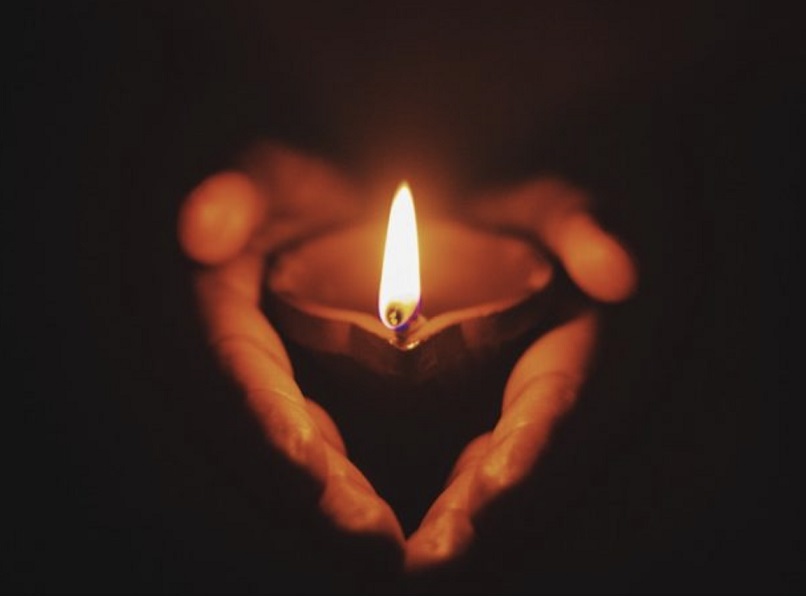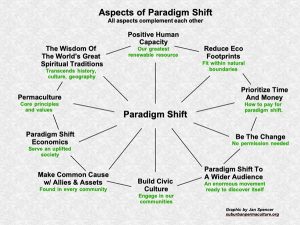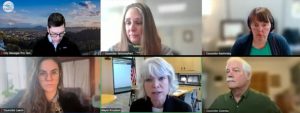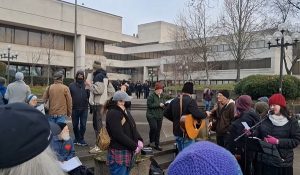Memorial ceremony aims to reduce trauma this year
8 min read
Presenter: The city will again mark the longest night of the year with a homeless memorial. Members of the Homelessness and Poverty Work Group are asking for one small change. Launching that discussion Oct. 7, Human Rights Commissioner John Bradley.
John Bradley (Human Rights Commission): Let’s see… There was also a disruption last year.
[00:00:17] A member of the community who was unhappy with then-Mayor Vinis’s approach to homelessness disrupted the event by yelling and then throwing a bowl of chili at or kind of toward Mayor Vinis, but actually didn’t hit Mayor Vinis at all. It hit Blake Burrell and Scott Lemons, who are both like, you know, strong advocates for people experiencing homelessness.
[00:00:49] To my knowledge, no one was harmed. It was a bit shocking, frightening. It probably was, for some folks, probably was anxiety-provoking and in compromised psychological safety.
[00:01:05] I believe the same individual, though it could have been a separate person, also overturned the Police Commission’s table later on in the memorial service and yelled and left, kind of ran out is my memory of the event. There was also a silent demonstration, which did not disrupt the event, and to my knowledge wasn’t a problem.
[00:01:35] And Richard, I see you have your hand up.
[00:01:38] Richard Self (Homelessness and Poverty Work Group): Yes, I do.
[00:01:39] Presenter: The chili also hit Richard Self, a member of the work group.
[00:01:42] Richard Self (Homelessness and Poverty Work Group): I wore my chili with pride.
[00:01:45] The protests that happened, both the chili throwing and other demonstrations including the silent one, were in response to the mayor reading the names of those unhoused who had passed on, while inflicting pain at the same time with the policies against the homeless that let allowed the police to keep these sweeps up, that allowed the police to uproot people within 10 to 15 minutes, no 72-hour notice given, and to continue these practices.
[00:02:27] And so these people felt, rightly so, that the mayor had no business reading the names of the unhoused during this presentation, that somebody else should have done it. And that might be something to consider rather than have our current Mayor Knudson do this, who has done nothing to change the policies of the former mayor and nothing to help the unhoused during these times of crisis.
[00:02:55] People are being assaulted, uprooted and horribly treated by the police, who have no consideration for the homeless and they take their stuff and they throw it all away. They have actually been known to have urinated on tents and belongings of the unhoused so that they could call it a biohazard and throw everything away. Are we understanding why these people are p—– or not? I yield.
[00:03:32] John Bradley (Human Rights Commission): Thank you, Richard. I appreciate you sharing that. I think you’ll find that most of the people, perhaps all the people on this call are advocates or are folks experiencing homelessness. And some of us, myself included, you know, this is a very large part of the work that we do professionally. So we’re familiar with this dynamic.
[00:03:50] And so is Blake. Talking to Blake about this in the kind of our after-action review last year: The calling in of our city leaders to acknowledge these deaths and the loss that has been experienced to the street and to homelessness serves the community more than calling them out, if that makes sense.
For instance, I think that there’s logic in asking for the mayor to participate and to read the names, if nothing more than to have a full acknowledgement that they did exist and they were people and that they deserved dignity and respect.
[00:04:48] And so, I do appreciate that it is not without problems, because there are city policies and code and implementation that is harmful. Let’s get some other thoughts here. Junie, what are your thoughts about this?
[00:05:08] Junie Christopherson: I agree. I think it’s important to be able to give them respect and also show accountability for policies that have been enacted because you’re able to, kind of, acknowledge the other side of the situation that you are directly impacting. And I think that knowing how you’re impacting these people is important.
And so I agree, that maybe a statement of acknowledgement or something along those lines could be a good idea, if reading the names is not possible, without further violence. You know, I would hope that it wouldn’t be, but if it is causing more distress than good to the very same population that we’re trying to honor, I think that is something to acknowledge and maybe adjust in some way. But I agree that that accountability and responsibility is important to keep in there.
[00:06:03] John Bradley (Human Rights Commission): And Jaclyn, what are your thoughts?
[00:06:06] Jaclyn Merlo: I really appreciate what Junie just brought up about making a statement of acknowledgement. And I think that, John, you also brought up a good point about involving the mayor and showing the public that you’re bringing it to her attention as well. And I think kind of a little marriage between those ideas just sounds really good to me.
[00:06:26] John Bradley (Human Rights Commission): Thank you, Jaclyn. [Confirming name spelling], did you have any thoughts for us?
[00:06:31] HAPWG Member: No, I agreed with what you were saying, exactly.
[00:06:37] John Bradley (Human Rights Commission): All right. Well, thank you, [Confirming name spelling]. I appreciate it. The possibility also exists that after what occurred last year that the mayor may not attend. I don’t know. We haven’t had a discussion about it. And, of course, we have a new mayor this year. And so it’s entirely possible that the mayor may not be able to read the names.
[00:07:07] I do think this is an issue where I would want to defer to the thoughts and expertise of folks with the lived experience. I would like to hear a little bit more from Richard after we’ve all shared here.
[00:07:25] Presenter: Richard Self:
[00:07:26] Richard Self (Homelessness and Poverty Work Group): I’m just going to say that some of these horrible policies, as I just wrote (in the meeting chat), still exist. They’re still impacting the unhoused horribly. And there’s some of these policies that are not written policies, but the police use them anyhow. Again, the 10 to 15 minutes in the middle of the night, two o’clock in the morning, you’ve got 10 minutes to get up and get out of here, or we’re going to take you to jail, or God knows what else. These policies still exist.
[00:08:02] The new mayor has not done anything to get rid of them or to make things more equitable for those who are unhoused. So if the mayor considers coming, well, that’s awfully brave on her part, but she should have an anti-chili jacket.
[00:08:25] John Bradley (Human Rights Commission): Richard, do you have any thoughts about who should read the names, if not the mayor?
[00:08:31] Richard Self (Homelessness and Poverty Work Group): I think a member of the unhoused community or one of our distinguished unhoused advocates should be the one doing this. They understand what’s going on. They understand who died and why. Whereas, the mayor reading them those names well those names she might be acknowledging that people died but she has no idea who they are. Those of us who are close to the ground know exactly who they are. That’s half the reason of acknowledging people who have passed on that were unhoused, is to know who they are, know some of their stories, know why they passed on.
[00:09:15] Many of the people that were impacted by these existing policies died because of them. They were left out in the cold and they passed away because of these policies, which is contrary to everything that we’re trying to do. It’s contrary to the Egan Warming Centers or the name Thomas Egan whatsoever.
[00:09:40] This is not who we’re supposed to be here in Eugene. Having an elected official that knows nobody of the names they’re reading can spark, again, a backlash, if nothing else, of having people turning their backs on the mayor once again, as they did in the last time.
[00:10:04] There are people that work very hard to make life easier for the unhoused and they can’t, when they can’t even undo these policies that are so horrible.
[00:10:15] It was suggested by just a couple of city councilors that instead of going after those people who are in RVs and making them relocate or having them towed, that there might be some kind of barter system where people who are either unhoused or advocates could help the repair these RVs and maybe get them going so they’re not in a position to be towed or anything like that. That was immediately struck down.
[00:10:48] So it’s where our city government is, compared to what needs to be done, that makes this a combustible situation. And that’s why people get mad and that’s why I wore chili last year.
[00:11:08] John Bradley (Human Rights Commission): Thank you Richard. I think Junie, I think I saw your hand next.
[00:11:13] Junie Christopherson: Yeah, really quick. I just wanted to touch on what Richard said about the people with lived experience being the one to acknowledge. And as I was listening to your words, Richard, it made a lot of sense and so I was wondering if you have any suggestions on how the city government and the mayor can still take accountability without being as intrusive to the community, or how else there could be support offered in that way besides getting the policies changed and advocating to the City Council directly, is what we’re aiming for as well.
[00:11:55] Richard Self (Homelessness and Poverty Work Group): You know, there are policies that has to be here for the safety of the community and so forth, but if the mayor would just address the 10- to 15-minute thing the mayor would just say, you know, that’s not right. We don’t need to have people uprooted in the middle of the night for 10 to 15 minutes to get the hell out. Maybe she would have some credibility in being a part of this procedure or you know procession that we’re doing on the 21st or what have you.
[00:12:31] So it’s up to the mayor and the city to want to address any of these issues before this time that would make it so it would be a much more peaceful situation. But to leave things as they are where people are just being completely abused and mistreated because they’re unhoused leaves people with a bad taste in their mouth and you can’t help what their reaction will be.
[00:13:03] So, it’s up to the city. It’s up to the mayor. If she’s an advocate for the unhoused, then let’s see it. Let’s just not talk about it, let’s see it. And if she can’t show it, then she has no business being there.
[00:13:18] Presenter: Planning continues for Eugene’s homeless memorial on the winter solstice, Dec. 21, from 5 to 7. The group hopes to reserve an indoor location, either the Farmers Market or The Atrium.




